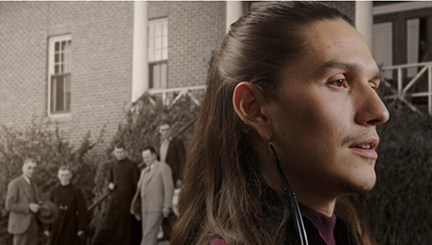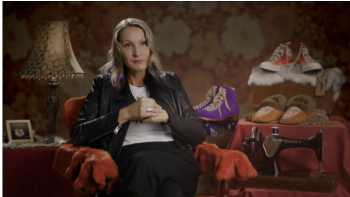Image Caption
Summary
Local Journalism Initiative Reporter
Windspeaker.com
Update: The Vancouver International Film Festival (VIFF) announced their awards Sept. 5, and Best BC Film goes to WaaPaKe by Jules Arita Koostachin. The film is awarded $10,000, presented by Creative BC and $15,000 in post-production services credit supplied by Company 3.
Read our story below:
Dr. Jules Arita Koostachin knows there are a lot of Canadian films that have been made about the residential school system, however, her latest directorial effort, a movie titled WaaPaKe (Tomorrow), is different, she said.
“I was more focused on the next generation in terms of our own lived experience and how it was like being raised by a survivor. I was kind of steering away from the survivor experience even though I’ve included it.”
WaaPaKe (Tomorrow) includes a variety of interviews that Koostachin conducts with family members of survivors.
WaaPaKe (Tomorrow) will have its world premiere at the Vancouver International Film Festival on Oct. 1. It will also be screened two other times at the festival, on Oct. 3 and Oct. 4.
The film includes Koostachin interviewing her own mother, who attended a residential school, and her son Asivak. Koostachin herself is interviewed.
“We’ve been very focused on survivors, and rightfully so,” said Koostachin, a member of Attawapiskat First Nation in Ontario, who currently lives in Vancouver. “But we haven’t really spoken too much about the next generation and how it has impacted us and our parenting.”
The National Film Board of Canada (NFB) is distributing the film. It was produced by Teri Snelgrove at NFB’s BC & Yukon Studio.
WaaPaKe (Tomorrow) will also be screened at the imagineNATIVE Film + Media Arts Festival in Toronto, which will have in-person screenings from Oct. 17 to Oct. 22.
The annual imagineNATIVE festival is celebrating its 24th anniversary this year and is the world’s largest festival featuring content exclusively from Indigenous creators.
“That is predominantly an Indigenous audience as well, so that will be interesting in terms of how they perceive the film,” Koostachin said.
Koostachin is thrilled the movie will have its world premiere in her current British Columbia hometown.
“It’s kind of exciting to be here and where we shot the film for the most part,” she said. “It’s special and I’m excited. It’s weird when you have an audience watching your work. As an artist or storyteller you feel vulnerable and (wonder) did people get this?”
Koostachin said making the film was especially challenging since it involved her own family’s history.
“It was a very personal story with my mom,” she said. “I think it’s one of those things, when your mom is a survivor, you almost have to tread carefully. You don’t go all out, obviously. I did in my interview. But you have to be very selective in the editing process because I think she is fragile or, in my mind, she’s fragile. So, you have to be really careful.”
Koostachin said there was plenty of editing work that was required with her interviews to get a final product she was happy with.

“You don’t want to revictimize anyone,” she said. “But then also I think the flipside of it is speaking your own truth without holding back. With family dynamics you want to say something but you can’t. So, it’s one of those things. And I think that was the biggest challenge. How much can I speak to without hurting her?”
Koostachin said similar care was taken with her other interviews.
“We had to be very selective that the story was actually moving forward,” she said. “And then the underlying theme was obviously of hope. So, we didn’t want to focus so much on the trauma, but more so how do we heal from intergenerational trauma.
“We had the time to actually do that, spend the time on the transcripts. So, it was very kind of collaborative with my team. You know, when you make films that are independent you’re always rushed. You’ve got to get things done and do it fast. But I think this is the first time I’ve worked on an NFB film where you actually had the time to process what you just did.”
Koostachin said she was not concerned about interviewing her son, as he is 29 years old and also an actor.
“I wasn’t quite sure where he was going to go with his interview,” she said. “But I was actually quite surprised how articulate he was about his own experience, because we all lived in the same house—my grandparents, my mom and then my kids. He had a close relationship with (my mother). It’s not like a grandparent you see once a year.”
Local Journalism Initiative Reporters are supported by a financial contribution made by the Government of Canada.

